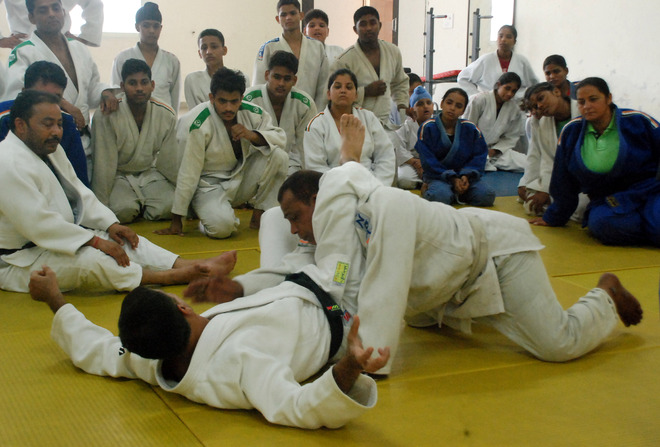Indervir Grewal
Tribune news service
Chandigarh, september 25
On the first day of last year’s Commonwealth Games, India won seven medals, including two silver and one bronze in judo. And one of the medal-winners who found instant popularity was Navjot Chana, who won the silver in men’s judo, in the 60 kg category.
Apart from him being a relatively unknown entity outside the judo community, what was more surprising about him was that he was from Punjab. Judo as a sport doesn’t have a high profile in the state. However, Punjab has always been one of the top states in the sport in the country. Out of the four medallists for India in judo at the Glasgow CWG, two were from Punjab — Rajwinder Kaur won a bronze in the women’s +78 kg category.
At the national level, Punjab judokas have regularly featured among the medallists. At the Kerala National Games earlier this year, Punjab won five gold, four silver and two bronze medals in the sport. At the 2011 edition of the event, Punjab won three gold, two silver and six bronze medals.
“In judo, Punjab has always been among the top five states in the country,” said Jiwan Sharma, former national champion and national coach.
However, the progress of a sport is always measured in comparison with its past, and Sharma said that judo has not seen much progress in Punjab. In fact, he said that the level has fallen over the last couple of decades.
“Punjab judokas still get medals at the national championships, but the state’s dominance, especially in the women’s section, has decreased. Earlier, the women would bring back the overall championship trophy. The other states have improved, while Punjab hasn’t progressed much,” said Sharma, a senior coach at NIS, Patiala.
Sharma, along with the former national champion and senior coach Tony Lee, recently held a five-day clinic for Punjab’s coaches on the invitation of the Punjab Institute of Sports (PIS) and the Sports Department.
Fifteen coaches from across the state attended the clinic in Mohali — 15 is a discouraging number for a state as big as Punjab. Out of the 15, only 10 were Sports Department coaches. One was a Sports Authority of India (SAI) coach, one was employed with Punjab Police and the remaining three were physical education teachers in schools.
There are around 15 judo centres running across the state, with about 1,000-1,200 trainees. Compared to the 15,000 trainees of hockey in the state, the number seems disappointing. And the existing centres don’t get proper support from the Sports Department or the state federation.
“Sometimes we have to wait for months for something as essential as the mats. This is the first time this kind of a clinic has been organised for us,” said one of the coaches who attended the clinic.
Despite these shortcomings, Punjab judokas have been among the best. “There is a lot of talent and potential. Judo is a contact sport and the physical attributes of an athlete are very important. People from the northern states like Punjab and Haryana have always been good in contact sports because of their strong physical build,” said Lee, who retired recently after being a coach with the SAI for almost four decades. “But the youngsters are not getting proper support,” said Sharma. “There is no proper system. For instance, the coaches who attended the clinic were not on the same page. Some of the coaches, including the physical education teachers, had misconceptions about some of the very basic concepts of judo. So this is the first and most important step — to educate the coaches about the modern techniques. Most of them are far behind.”
Sharma and Lee said that it was the first time they had come to Punjab for a clinic or heard of a coaching clinic in the state. “This is a great initiative. The coaching clinics need to be a regular feature. Also, the number of coaches has to increase and more centres need to come up; only then will the sport grow and spread at the grassroots level,” said Lee.
The two coaches added that the situation isn’t any better at the national level. “There is no system for training in India. Judo is constantly evolving and most of the coaches in India are unaware of the modern techniques,” said Lee. Despite being two of the most respected coaches in India, Lee and Sharma said they were rarely invited to host clinics for coaches across the country.
The other big problem, the coaches said, was the lack of match practice. “We have no tournaments except the Nationals in every age group. Then there are the state championships. That’s only two-three events in a year,” said Lee.
“In Japan or Korea, there is a tournament every week during the season. The same is the case in Europe. How can we compete with these nations?” added Lee.
Judo was introduced at the Olympics in 1964 and till now only five Indians have qualified for the Games. Garima Chaudhary, who was the only Indian judoka to qualify for the 2012 London Olympics, is coached by Sharma. At the Asian Games, where judo was introduced in 1986, the competition is much tougher than in the Commonwealth Games. India has won only five bronze medals at the Asian Games — four in 1986 and one in 1994. Clearly, India has slipped — Chana, Rajwinder, the other judokas and the coaches have much catching-up to do.
Unlock Exclusive Insights with The Tribune Premium
Take your experience further with Premium access.
Thought-provoking Opinions, Expert Analysis, In-depth Insights and other Member Only Benefits
Already a Member? Sign In Now










